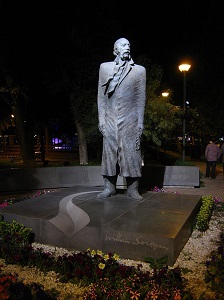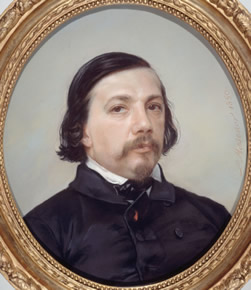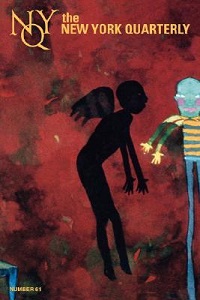|
De Amerikaanse dichter en schrijver William Saroyan werd geboren op 31 augustus 1908 in Fresno, Californië. Zie ook mijn blog van 31 augustus 2010 en eveneens alle tags voor William Saroyan op dit blog.
Uit: The Daring Young Man on the Flying Trapez
“He (the living) dressed and shaved, grinning at himself in the mirror. Very unhandsome, he said; where is my tie? (He had but one.) Coffee and a gray sky, Pacific Ocean fog, the drone of a passing street car, people going to the city, time again, the day, prose and poetry. He moved swiftly down the stairs to the street and began to walk, thinking suddenly. It is only in sleep that we may know we live. There only, in that living death, do we meet ourselves and the far earth, God and the saints, the names of our fathers, the substance of remote moments: it is there that the centuries merge in the moment, that the vast becomes the tiny, tangible atom of eternity.
He walked into the day as alertly as might be, making a definite noise with his heels, perceiving with his eyes the superficial truth of streets and structures, the trivial truth of reality. Helplessly his mind sang, He flies through the air with the greatest of ease, the daring young man on the flying trapeze, then laughed with all the might of his being. It was really a splendid morning: gray, cold, and cheerless, a morning for inward vigor; ah, Edgar Guest, he said, how I long for your music.
In the gutter he saw a coin which proved to be a penny dated 1923, and placing it in the palm of his hand he examined it closely, remembering that year and thinking of Lincoln, whose profile was stamped upon the coin. There was almost nothing a man could do with a penny. I will purchase a motor-car, he thought. I will dress myself in the fashion of a fop, visit the hotel strumpets, drink and dine, and then return to the quiet. Or I will drop the coin into a slot and weigh myself.
It was good to be poor, and the Communists-but it was dreadful to be hungry. What appetites they had, how fond they were of food! Empty stomachs. He remembered how greatly he needed food. Every meal was bread and coffee and cigarettes, and now he had no more bread. Coffee without bread could never honestly serve as supper, and there were no weeds in the park that could be cooked as spinach is cooked.
If the truth were known, he was half starved, and there was still no end of books he ought to read before he died. He remembered the young Italian in a Brooklyn hospital, a small sick clerk named Mollica, who had said desperately, I would like to see California once before I die. And he thought earnestly, I ought at least to read Hamlet once again; or perhaps Huckleberry Finn.”

William Saroyan (31 augustus 1908 – 18 mei 1981)
Standbeeld in Jerevan
De Franse schrijver en journalist Éric Zemmour werd geboren op 31 augustus 1958 in Montreuil-sous-Bois, vlakbij Parijs. Zie ook alle tags voor Éric Zemmour op dit blog.
Uit: Le Dandy rouge
« Je ne suis pas un écrivain. Pas un philosophe ni un révolution-naire. Je ne suis pas un poète. Pas un intellectuel, comme on dit dé-sormais à Paris. Je ne suis pas Kautsky. Pas Bernstein, Karl Liebk-necht, ni Rosa Luxemburg. Je ne suis pas non plus un tribun comme August Bebel, même si je trône à la tribune, à côté des chefs du par-ti, même si je découvre les discours quelques heures avant qu'ils ne soient prononcés, discute un mot ou un souvenir historique, corrige une phrase ou un concept révolutionnaire. Je ne suis rien. Un com-plet sombre parmi des complets sombres. Une tonsure parmi des tonsures. Un militant parmi des militants. Un ouvrier parmi des ou-vriers, grandi dans le parti au bénéfice de l'âge et de la médiocrité qui n'inquiète pas. On m'écoute car on sait que ce ne sera pas long. On me lit car on s'attend à un texte de synthèse. Ce soir, c'était mon dernier congrès. C'est August qui m'a demandé de conclure. Un vieil homme pour une vieille histoire déjà. D'abord je n'osai effleu-rer cette estrade qu'il venait de martyriser de son corps d'homme rude ; je n'osai lancer mes mots fatigués et banals dans le tourbillon où sa voix tempétueuse avait emporté les esprits. Je ne suis pas un tribun. Souvent, je l'avoue, j'en ai rêvé : je rugis et des milliers de poitrines s'exclament à l'unisson ; je murmure et des milliers de souffles se retiennent, des milliers d'oreilles se dressent. Mais je ne suis pas un tribun. Pas un intellectuel, ni un philosophe, ni un poète. Pas un écrivain. Rien qu'un ouvrier, un militant, une tonsure, un complet sombre. Rien. Bien sûr, avec le temps, j'ai appris. J'ai conquis, peu à peu, d'autres mots ; mais ils se sentent toujours, dans mes phrases, comme en terre étrangère, occupée. Parfois, mes an-ciens mots, ceux de mon enfance au Moabit, dans les faubourgs de Berlin, reprennent le dessus."

Éric Zemmour (Montreuil-sous-Bois, 31 augustus 1958)
De Duitse dichter en schrijver Wolfgang Hilbig werd geboren in Meuselwitz op 31 augustus 1941. Zie ook mijn blog van 31 augustus 2010 en eveneens alle tags voor Wolfgang Hilbich op dit blog.
'laßt mich doch‘
laßt mich doch
laßt mich in kalte fremden gehn
zu hause
sink ich
in diesen warnen klebrigen brei
der kaum noch durchsichtig ist
der mich festhält der mich so
festhält
laßt mich in die einsame fremde
dort will ich um mich haun
mit meinem schatten fechten daß
hiebe pfeifen in wasserklarer luft
hier würgt mich stille
hier saugt zäher brei an meiner hand
laßt mich
wo die sicht klar ist
oder in steine in hohe steinwände in
mauern für meinen schädel - -
'ihr habt mir ein haus gebaut‘
ihr habt mir ein haus gebaut
laßt mich ein andres anfangen.
ihr habt mir sessel aufgestellt
setzt puppen in eure sessel.
ihr habt mir geld aufgespart
lieber stehle ich.
ihr habt mir einen weg gebahnt
ich schlag mich
durchs gestrüpp seitlich des wegs.
sagtet ihr man soll allein gehn
würd ich gehn
mit euch.

Wolfgang Hilbig (31 augustus 1941 - 2 juni 2007)
Cover biografie
De Engelse schrijfster Elizabeth von Arnim werd op 31 augustus 1866 geboren in Kirribilli Point in de buurt van Sydney. Zie ook mijn blog van 31 augustus 2010 en eveneens alle tags voor Elizabeth von Arnim op dit blog.
Uit: Elizabeth and Her German Garden
“These women accept their beatings with a simplicity worthy of all praise, and far from considering themselves insulted, admire the strength and energy of the man who can administer such eloquent rebukes. In Russia, not only may a man beat his wife, but it is laid down in the catechism and taught all boys at the time of confirmation as necessary at least once a week, whether she has done anything or not, for the sake of her general health and happiness."
I thought I observed a tendency in the Man of Wrath rather to gloat over these castigations.
"Pray, my dear man," I said, pointing with my whip, "look at that baby moon so innocently peeping at us over the edge of the mist just behind that silver birch; and don't talk so much about women and things you don't understand. What is the use of your bothering about fists and whips and muscles and all the dreadful things invented for the confusion of obstreperous wives? You know you are a civilised husband, and a civilised husband is a creature who has ceased to be a man.
"And a civilised wife?" he asked, bringing his horse close up beside me and putting his arm round my waist, "has she ceased to be a woman?"
"I should think so indeed,--she is a goddess, and can never be worshipped and adored enough.”
(...)
“I have always had a liking for pilgrimages, and if I had lived in the Middle Ages would have spent most of my time on the way to Rome. The pilgrims, leaving all their cares at home, the anxieties of their riches or their debts, the wife that worried and the children that disturbed, took only their sins with them, and turning back on their obligations, set out with that sole burden, and perhaps a cheerful heart.”

Elizabeth von Arnim (31 augustus 1866 – 9 februari 1941)
Cover
De Franse dichter en schrijver Théophile Gautier werd op 31 augustus 1811 geboren in Tarbes (departement Hautes-Pyrénées. Zie ook mijn blog van 31 augustus 2010 en eveneens alle tags voor Théophile Gautier op dit blog.
L'Escurial
Posé comme un défi tout près d'une montagne,
L'on aperçoit de loin dans la morne campagne
Le sombre Escurial, à trois cents pieds du sol,
Soulevant sur le coin de son épaule énorme,
Éléphant monstrueux, la coupole difforme ;
Débauche de granit du Tibère espagnol.
Jamais vieux Pharaon, au flanc d'un mont d'Égypte,
Ne fit pour sa momie une plus noire crypte ;
Jamais sphinx au désert n'a gardé plus d'ennui ;
La cigogne s'endort au bout des cheminées ;
Partout l'herbe verdit les cours abandonnées ;
Moines, prêtres, soldats, courtisans, tout a fui !
Et tout semblerait mort, si du bord des corniches,
Des mains des rois sculptés, des frontons et des niches,
Avec leurs cris charmants et leur folle gaîté,
Il ne s'envolait pas des essaims d'hirondelles,
Qui, pour le réveiller, agacent à coups d'ailes
Le géant assoupi qui rêve éternité !...
Le poète et la foule
La plaine un jour disait à la montagne oisive :
" Rien ne vient sur ton front des vents toujours battu ! "
Au poète, courbé sur sa lyre pensive,
La foule aussi disait : " Rêveur, à quoi sers-tu ? "
La montagne en courroux répondit à la plaine :
" C'est moi qui fais germer les moissons sur ton sol ;
Du midi dévorant je tempère l'haleine ;
J'arrête dans les cieux les nuages au vol !
Je pétris de mes doigts la neige en avalanches ;
Dans mon creuset je fonds les cristaux des glaciers,
Et je verse, du bout de mes mamelles blanches,
En longs filets d'argent, les fleuves nourriciers.
Le poète, à son tour, répondit à la foule :
" Laissez mon pâle front s'appuyer sur ma main.
N'ai-je pas de mon flanc, d'où mon âme s'écoule,
Fait jaillir une source où boit le genre humain ? "

Théophile Gautier (31 augustus 1811 – 23 oktober 1872)
Portret door Léon Riesener, 1850
De Amerikaanse dichter, criticus en tijdschriftredacteur Raymond P. Hammond werd geboren op 31 augustus 1964 in Roanoke, Virginia. Zie ook mijn blog van 31 augustus 2010 en eveneens alle tags voor Raymond P. Hammond op dit blog.
Uit: Meet the Press: Nin Andrews interviews Raymond Hammond
“NA: I read that NYQ Books only publishes books by poets who have published in The New York Quarterly magazine. How does that work? Do you solicit manuscripts from these poets after they have published in the journal?
RH: We do not solicit work. We rely on two very simple concepts to select manuscripts. The first is prior acceptance for publication in the magazine. Prior acceptance gives us a good starting point for manuscripts as the editorial vetting is already done, and done at no cost to the author such as in a contest scenario. The second concept is that we also do not accept unsolicited manuscripts—an invitation must be extended. The invitation gives us a modicum of control over how many books we consider at any given time, and most importantly it allows us to better coordinate the books we are looking for which keeps the press as eclectic as the magazine. The vetting and the invitation process allow us a starting point of already knowing the author and their work.
NA: Do you then solicit poets to submit to the New York Quarterly? Or are you, as I would imagine, already overwhelmed with submissions?
RH: We work very hard to keep the selection of poems for the magazine to just that, the poem for the poem’s sake for the sake of the magazine. The way that a poet begins to get noticed for inclusion in the books is when we start accepting repeated submissions from them, then we say to ourselves, maybe we should just do a book of their work. I have found so far that having the books for that added venue is a very nice option because some people I just want to publish more of their work than publication in the magazine will allow.”

Raymond P. Hammond (Roanoke, 31 augustus 1964)
Cover van de The New York Quarterly, 2007
|



